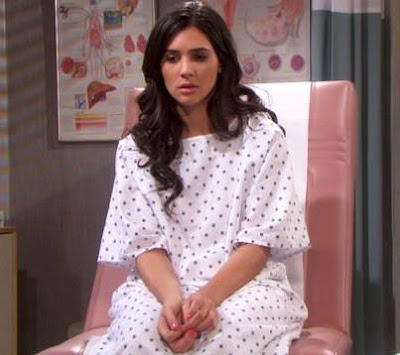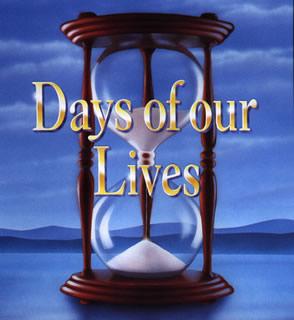“Like sands through the hourglass, so are the days of our lives.”
 |
| (Slow, repetitive, and mesmerizing.) |
While soap operas are often ignored (or recognized with an emphatic eye roll) by critics, one can look to them for the state of social norms in America.
Days of Our Lives, an NBC soap opera that has been on the air since 1965, has recently had two intertwining story arcs about homosexuality and abortion that mirror many current social conversations and “concerns.”
Will Horton’s gradual coming out as gay over the last couple of years was refreshing, since Days hadn’t been a bastion of realistic progressive tolerance over the years. It was difficult for him, and his parents (Sami and Lucas) reacted with shock and worked through their emotions on screen. I imagined mothers watching and commiserating with Sami’s fumbles, and listening to Will’s struggles as they experienced their own sons and daughters coming out.
I also imagine that this normalization of homosexuality–not just in media, but more importantly, in people’s personal lives (as they personally know people who come out)–is the reason that support for gay marriage is at an all-time high. People’s stories help drive policy, and when those stories are in the form of fictional “stories,” mass audiences are introduced to progressive ideas.
During Nov. 14’s episode, I watched with awe as Will and Sonny Kiriakis slept together. I again imagined audiences of moderate/conservative women being shocked (and maybe disturbed not by the scene itself, but by the fact that they might have found it really sexy).
 |
| Will, left, and Sonny. |
At the same time, though, Gabi Hernandez is finding out that she is pregnant. Gabi and Will had been a couple before he fully realized his sexuality, and they’d had a one-night stand after a particularly traumatic event. Will is the father.
Gabi and Will decide, after much discussion, to terminate the pregnancy. I was nervous as the arc played out, because when Mimi Lockhart had chosen to get an abortion in 2004, she was rendered infertile and her boyfriend left her, clearly leaving the viewer with a message about abortion.
 |
| Gabi interrupts Will and Sonny to tell Will about her pregnancy. |
However, for the most part, the conversations that Gabi had during her decision process were reassuring, in regard to making reasonable, logical claims about wanting to finish school and be a mom someday, but not now. Will took a bit more convincing, but the subject was dealt with without judgment.
When he challenges her decision, she says, “Look, I told you I spent all night thinking about this–I’m straight, you’re gay, we’re students, I’m a waitress… What kind of life could we even give this baby?”
At one point, Will does ask about adoption. He asks if she’s thought about it and she says that she has, but her older brother, Rafe, and mother would want her to keep the baby. Will agreed that his parents would, too.
Gabi says, “I feel like the world would be a better place if it was filled with wanted children.”
Gabi’s decision-making process is mature and tempered. However, there is a backdrop of scheming knights-in-shining armor thinking they need to protect her. Sami tells Rafe and Nick (who they all believe to be the father), and the three manage to get into Gabi’s apartment, look at her computer and see the family planning website, do investigative work and even dig in her trash to find the clinic’s number. This contrast to Gabi’s independence is stark and troublesome.
Meanwhile, Gabi and Will are at the clinic together–it’s clean, and the nurses and doctor are kind and professional.
The audience isn’t shown the sonogram, or anything to make us feel a certain way about what’s happening.
 |
| Gabi, waiting for the doctor to perform the abortion. |
While the procedure is supposedly taking place, Will starts to become unhinged in the waiting room, and Rafe, Sami and Nick show up. Gabi comes out of the exam room crying, and admits that she couldn’t go through with it.
Thankfully, none of the men’s temper-fueled pressuring of the nurse to let them back to see Gabi and stop her worked. She came to the decision herself.
When Will tells her he’d tried to get in there to stop it, Sami cuts in and says, “It’s not your place–it’s Gabi’s decision to make.” Throughout this entire story line, Sami has provided a voice of dissent to the men who are trying to make decisions for Gabi and treat her like she’s a child. (One could also point out that Sami was the reason they were meddling in the first place–but it’s also Sami.)
Gabi says, “I didn’t do it–you don’t understand–I tried to convince myself it was the best thing and I totally realized I was being horribly selfish.”
While no one would want her to have had an abortion against her will, she sounds like a different person than she did just a few episodes prior.
 |
| Rafe feels the need to protect her. |
As of Monday’s episode, Nick has proposed marriage to Gabi (he wants them to raise the baby together), and Will and Sonny are in bed again (although Sonny doesn’t know about the pregnancy yet).
On one hand, we can see this daytime TV story arc as a positive development in expanding the discussion of reproductive choice. Almost. Rafe and Nick’s (and Sami’s) outright invasion into Gabi’s privacy was abhorrent and not dealt with as such, and the post-clinic rhetoric about abortion was nowhere near as even-handed as the conversations prior, or the scenes with the clinic staff. However, the original conversations about raising wanted children and the positive portrayal of the clinic were refreshing. Gabi’s choice was Gabi’s choice; however, I’m not sure that point was actually made to the viewer who wasn’t desperately looking for it.
While support for gay rights has surged in recent years, support for abortion rights has stalled and in some polls, slid backward. I imagine that Gabi’s story is an analogy of that confusion of support and disdain, largely because unlike coming out as gay, women do not have the equivalent of “coming out” after choosing abortion. The stories–real and fictional–are essential to public perception.
Soap operas–although they are much maligned by audiences and critics–have long had an important role in social conversations. In 1964, NBC’s Another World introduced TV’s first abortion story. Their portrayals of gay sexuality have been remarkable in recent years. This genre of storytelling, though, gets very little attention on a critical scale. As the Museum of Broadcast Communication notes:
“Particularly in the United States, the connotation of ‘soap opera’ as a degraded cultural and aesthetic form is inextricably bound to the gendered nature of its appeals and of its target audience. The soap opera always has been a ‘woman’s’ genre, and, it has frequently been assumed (mainly by those who have never watched soap operas), of interest primarily or exclusively to uncultured working-class women with simple tastes and limited capacities. Thus the soap opera has been the most easily parodied of all broadcasting genres, and its presumed audience most easily stereotyped as the working-class ‘housewife’ who allows the dishes to pile up and the children to run amuck because of her ‘addiction’ to soap operas. Despite the fact that the soap opera is demonstrably one of the most narratively complex genres of television drama whose enjoyment requires considerable knowledge by its viewers, and despite the fact that its appeals for half a century have cut across social and demographic categories, the term continues to carry this sexist and classist baggage.”
These stories have weight, and our dismissal of them does reek of sexism and classicism. As Ebony Utley says in a Ms. Magazine blog post:
“As a feminist and proud soap-watcher, I’d argue that soaps are too often wrongly dismissed as sex-filled drivel. Feminists, in particular, should support the feminine values, diverse representations of women, social issues and global community promoted by daytime television’s fantasy worlds.Soap operas celebrate a private sphere controlled primarily by women who have agency. In it, intimacy, forgiveness, redemption, family, and community are honored.”
These “stories” are important to our sense of self as a culture. Portraying two gay men having sex on network television in the middle of the day changes our conversations. Having characters discuss, at length, the pros and cons of choosing abortion and visiting an abortion clinic on network television in the middle of the day changes our conversations.
If we look closer at this genre, we see American culture and changing norms reflecting back at us.
(Alright, maybe American culture has fewer exorcisms, resurrections, body doubles and less baby-switching, amnesia and brainwashing. Maybe.)
—
Leigh Kolb is a composition, literature and journalism instructor at a community college in rural Missouri.
Leigh Kolb is a composition, literature and journalism instructor at a community college in rural Missouri.
